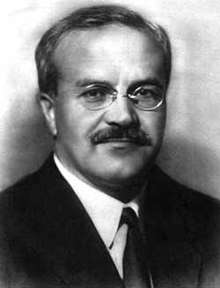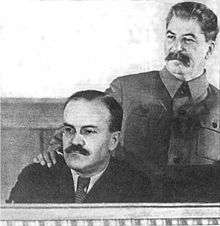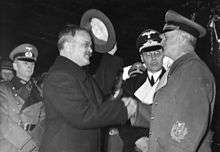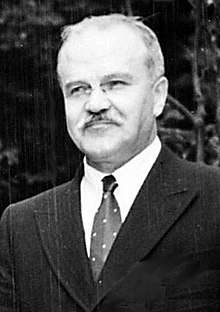
The trouble with free elections is that you never know how they are going to turn out.
Vyacheslav Molotov (in Russian Вячесла́в Миха́йлович Мо́лотов), Vjačeslav Mihajlovič Molotov, (9 March 1890 {February 25 O.S.} – 8 November 1986), was Soviet politician and diplomat, a leading figure in the Soviet government from the 1920s, when he rose to power as a protégé of Joseph Stalin, to the 1950s, when he was dismissed from office by Nikita Khrushchev. He was the principal Soviet signatory of the Nazi-Soviet non-aggression pact of 1939 (also known as the Molotov-Ribbentrop Pact).
Quotes

The time has come when the old world must make way for the new.

One blow from the German army and another from the Soviet army put an end to this ugly product of Versailles.

There is no alternative to class struggle.
- Life has improved, and now as never before the doors to a happy and cultured life for all the peoples of our Union stand wide open. We are already enjoying the first fruits of our victory and we see that an unparalleled rise in the standard of living and culture of all the peoples of the Soviet Union awaits us. And in spite of all this, we have not yet seen the last of people who in their blind hatred of the new world are planning the seizure and dismemberment of the Soviet Union. Well, what shall we say to them? It is true that we appeared in the world without the permission of these gentlemen, and undoubtedly against their wishes. . . . This means that the time has come when the old world must make way for the new.
- Speech (10 January 1930) as quoted in The Communist International (1936) Vol. 13
- Events arising out of the Polish-German War have revealed the internal insolvency and obvious impotence of the Polish state. Polish ruling circles have suffered bankruptcy… Warsaw as the capital of the Polish state no longer exists. No one knows the whereabouts of the Polish Government. The population of Poland have been abandoned by their ill-starred leaders to their fate. The Polish State and its Government have virtually ceased to exist. In view of this state of affairs, treaties concluded between the Soviet Union and Poland have ceased to operate. A situation has arisen in Poland which demands of the Soviet Government especial concern for the security of its State. Poland has become a fertile field for any accidental and unexpected contingency that may create a menace for the Soviet Union...Nor can it be demanded of the Soviet Government that it remain indifferent to the fate of its Blood Brothers, the Ukrainians and White Russians inhabiting Poland, who even formerly were nations without rights and who now have been utterly abandoned to their fate. The Soviet Government deems it its sacred duty to extend the hand of assistance to its brother Ukrainians and White Russians inhabiting Poland.
- Extracts from Molotov’s broadcast speech on the Soviet invasion of Poland (17 September 1939) Mirovoe Khoziaistvo, 1939, 9, p. 13. In Soviet Documents on Foreign Policy. Volume I: 1917-1941. Jane Tabrisky Degras (ed.) 1953, Oxford University Press. Pages 374-5
- Germany, which has lately united 80 million Germans, has submitted certain neighboring countries to her supremacy and gained military strength in many aspects, and thus has become, as clearly can be seen, a dangerous rival to principal imperialistic powers in Europe — England and France. That is why they declared war on Germany on a pretext of fulfilling the obligations given to Poland. It is now clearer than ever, how remote the real aims of the cabinets in these countries were from the interests of defending the now disintegrated Poland or Czechoslovakia.
- Molotov's report on (29 March 1940), after the Polish defeat, as quoted in the weekly Soviet newspaper Moscow News, published by Mezhdunarodnaya Kniga (1 April 1940)
- One blow from the German army and another from the Soviet army put an end to this ugly product of Versailles.
- Statement after the fall of Poland, as quoted in Legitimacy and Force (1988) by Jeane J. Kirkpatrick, p. 49
- Only a fool would attack us.
- Statement of June 1941, as quoted in Hitler and Stalin : Parallel Lives (1993) by Alan Bullock, p. 715
- This is not the first time that our people have had to deal with an attack of an arrogant foe. At the time of Napoleon’s invasion of Russia our people’s reply was war for the fatherland, and Napoleon suffered defeat and met his doom.
It will be the same with Hitler, who in his arrogance has proclaimed a new crusade against our country. The Red Army and our whole people will again wage victorious war for the fatherland, for our country, for honor, for liberty.
The government of the Soviet Union expresses the firm conviction that the whole population of our country, all workers, peasants and intellectuals, men and women, will conscientiously perform their duties and do their work. Our entire people must now stand solid and united as never before.
Each one of us must demand of himself and of others discipline, organization and self-denial worthy of real Soviet patriots, in order to provide for all the needs of the Red Army, Navy and Air Force, to insure victory over the enemy.
The government calls upon you, citizens of the Soviet Union, to rally still more closely around our glorious Bolshevist party, around our Soviet Government, around our great leader and comrade, Stalin. Ours is a righteous cause. The enemy shall be defeated. Victory will be ours.
- We cannot lose Poland. If this line is crossed, they will grab us, too.
- Statement, as quoted in Surviving the Millennium (1994) by Hall Gardner, p. 236, with citations to Molotov Remembers (1993) by Felix Chuev, p. 54
- As long as we live in a system of states, and as long as the roots of fascism and imperialist aggression have not finally been extirpated, our vigilance in regard to possible new violators of peace should not slacken, and concern for the strengthening of cooperation between the peace-loving powers will continue to be our most important duty.
- As quoted in Strategy and Tactics of Soviet Foreign Policy (1963) by John Malcolm Mackintosh, p. 4
- Someone helped us a lot with the atomic bomb. The intelligence (service) played a huge role. These Rosenbergs suffered in America. It is not excluded that they helped us. But we shouldn't really speak about it, because we might receive this kind of help in the future.
- Statement about Julius and Ethel Rosenberg having performed espionage for the Soviet Union, as quoted in The FBI-KGB War : A Special Agent's Story (1995), by Robert J. Lamphere and Tom Shachtman, p. 306
- Our scientists all the more occupy advanced positions in the development of world science. By the example of their successes in the field of atomic energy, our scientists and technicians have vividly shown how much the increased might of the Soviet state and the further growth of its international authority depends on their efforts and practical successes.
- As quoted in Newsweek, Vol. 43, Issues 1-13 (1954), p. 133
- Who can think that this eviction of Germans was undertaken only as a temporary experiment? Those who adopted the decision on the eviction of the Germans from these territories, and who understood that Poles from other Polish districts would at once move into these territories, cannot suggest after a while to carry out reverse measures. The very idea of involving millions of people in such experiments is unbelievable, quite apart from the cruelty of it, both towards the Poles and the Germans themselves.
- As quoted in The German-Polish Frontier (1959) by Walter M. Drzewieniecki, p. 71
- The trouble with free elections is that you never know how they are going to turn out.
- Remark at the Berlin Conference (1954) according to an eyewitness writing in International Affairs Vol. 36 (1960), p. 4
- There is no alternative to class struggle.
- As quoted in The Fifty-Year War : Conflict and Strategy in the Cold War (2007) by Norman Friedman, p. 58
- The fact that atomic war may break out, isn't that class struggle? There is no alternative to class struggle. This is a very serious question. The be-all and end-all is not peaceful coexistence. After all, we have been holding on for some time, and under Stalin we held on to the point where the imperialists felt able to demand point-blank: either surrender such and such positions, or it means war. So far the imperialists haven't renounced that
- Molotov said it in 1976 when he was in active retirement.Molotov, Vyacheslav; Chuev, Felix; Resis, Albert (1993). Molotov remembers: inside Kremlin politics : conversations with Felix Chuev. I.R. Dee. p. 20. ISBN 1566630274.
- An atmosphere of extreme tension reigned during this period; it was necessary to act without mercy. I think that it was justified. If Tukhachevsky, Yakir, Rykov and Zinoviev had started up their opposition in wartime, there would have been an extremely difficult struggle; the number of victims would have been colossal. Colossal. The two sides would have been condemned to disaster. They had links that went right up to Hitler. That far. Trotsky had similar links, without doubt. Hitler was an adventurist, as was Trotsky, they had traits in common. And the rightists, Bukharin and Rykov, had links with them. And, of course, many of the military leaders.
- Quote from Ludo Martens's Another view of Stalin, pp. 177. Original quote from the Russian version of F. Chueva Sto sorok besed s MOLOTOVYM (Moscow: Terra, 1991), p. 413 (The quote does not appear in the French translation: Félix Tchouev, Conversations avec Molotov (Paris: Albin Michel, 1995).) The quote can also be found here
Quotes about Molotov
- Havoc and ruin had been around him all of his days, either impending on himself or dealt by him to others. Certainly in Molotov the Soviet machine had found a capable and in many ways characteristic representative — always the faithful Party man and Communist disciple. How glad I am at the end of my life not to have had to endure the stresses which he has suffered; better to never have been born. In the conduct of foreign affairs, Mazarin, Talleyrand, Metternich, would welcome him to their company, if there be another world to which Bolsheviks allow themselves to go.
- Winston Churchill, in The Second World War, Vol. I : The Gathering Storm (1948), Book I, Ch. 20 : The Soviet Enigma, p. 331
- Molotov has a fine forehead, and looks and acts like a French professor of medicine — orderly, precise, pedantic. His importance is sometimes not appreciated; he is by no means a mere figurehead, but a man of first-rate intelligence and influence. Molotov is a vegetarian and a teetotaler. Stalin gives him much of the dirty work to do. He had the nasty job of admitting how many cattle and hogs were killed by the peasants before the famine.
- John Gunther, in Inside Europe : Again Completely Revised (1938), p. 483
External links
- The Meaning of the Soviet-German Non-Aggression Pact Molotov speech to the Supreme Soviet on (31 August 1939)
- Reaction to German Invasion of (22 June 1941)
- Radio Address of the Vice-Chairman of the Council of People's Commissars of the USSR and People's Commissar of Foreign Affairs V.M. Molotov (22 June 1941)
- Annotated bibliography for Vyacheslav Molotov from the Alsos Digital Library for Nuclear Issues
This article is issued from
Wikiquote.
The text is licensed under Creative
Commons - Attribution - Sharealike.
Additional terms may apply for the media files.